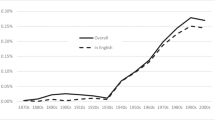Abstract
The purpose of this paper is to sketch an evolutionist Keynesian economics and to discuss its micro-foundation and non-neoclassical character. The word ‘evolutionist’ means economics based on the multi-agent-oriented system, composed of agents following the satisficing principle. The word ‘Keynesian’ means economic theory closely based on Keynes’ original works. First, we see the existing poor situation of Keynesian economics and argue what historical studies on Keynes’ works should be. Second, we show our interpretation on what Keynes actually did and discuss its micro-foundation by satisfying group behaviour.
Similar content being viewed by others
References
Clower, R. W. (1965) “The Keynesian Counter-Revolution: A Theoretical Appraisal,” in F. H. Hahn and F. P. R. Brechiling (eds) The Theory of Interest Rates, Macmillan, pp. 103–125.
Leijonhufvud, A. (1968) On Keynesian Economics and the Economics of Keynes: A Study in Monetary Theory, Oxford University Press.
Lucas, R. E. Jr (1972) “Expectation and the Neutrality of Money,” Journal of Economic Theory (April): 103–124.
- (1976) “Econometric policy evaluation: A critique, The Phillips Curve and Labor Markets,” Carnegie-Rochester Conferences Series on Public Policy Vol. 1, North-Holland Publishing Company, Amsterdam, pp. 19–46.
Hicks, J. R. (1937) “Mr. Keynes and the ‘Classics’: A Suggested Interpretation,” Econometrica (April): 147–159.
Hirai, T. (2003) Looking at Keynes’ Economics from Multiple Points of View, University of Tokyo Press, Tokyo
Keynes, J. M. (1971) Collected Writings of John Maynard Keynes, Vol. V. A Treatise on Money. I.The Pure Theory of Money (1930), Macmillan, London.
Robinson, J. (1971) Economic heresies: some old-fashioned questions in economic theory, Basic Books, New York.
Yoshida, H. (2001) “From ‘Historical Time’ to the economics of complexity,” in Y. Aruka (ed) Evolutionary Controversies in Economics, Springer-Verlag Tokyo, Tokyo, pp. 215–225.
Yoshida, M. (ed) (2003) The New Horizon of the Social Sciences on Complexity, Senshu university Press, Tokyo.
Yoshikawa, H. (2000) Macroeconomics, Sobunsha, Tokyo.
Weick, K. E. (1976) “Educational organization as loosely coupled systems,” Administrative Science Quarterly 21 (March): 1–19.
Author information
Authors and Affiliations
Corresponding author
About this article
Cite this article
Yoshida, M. Keynesian Economics—An Evolutionist Manifesto. Evolut Inst Econ Rev 1, 49–56 (2004). https://doi.org/10.14441/eier.1.49
Published:
Issue Date:
DOI: https://doi.org/10.14441/eier.1.49




